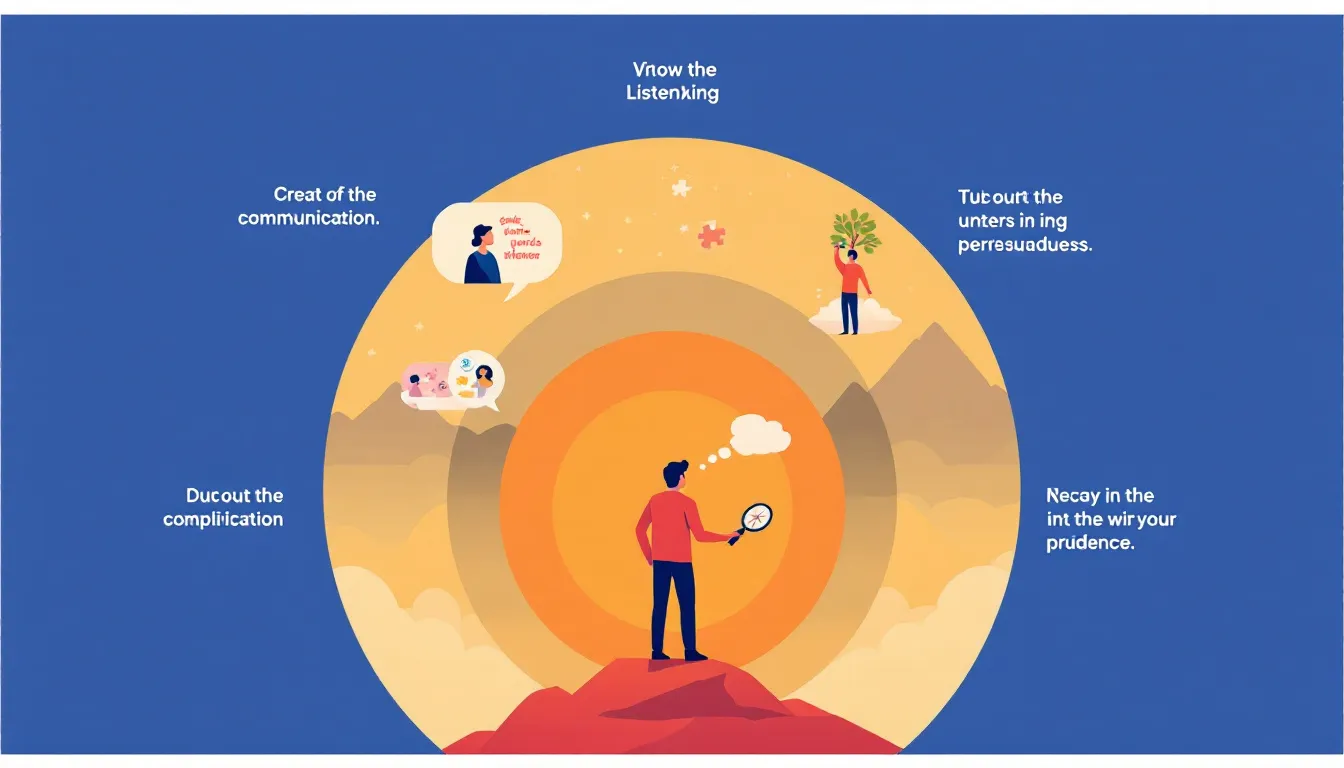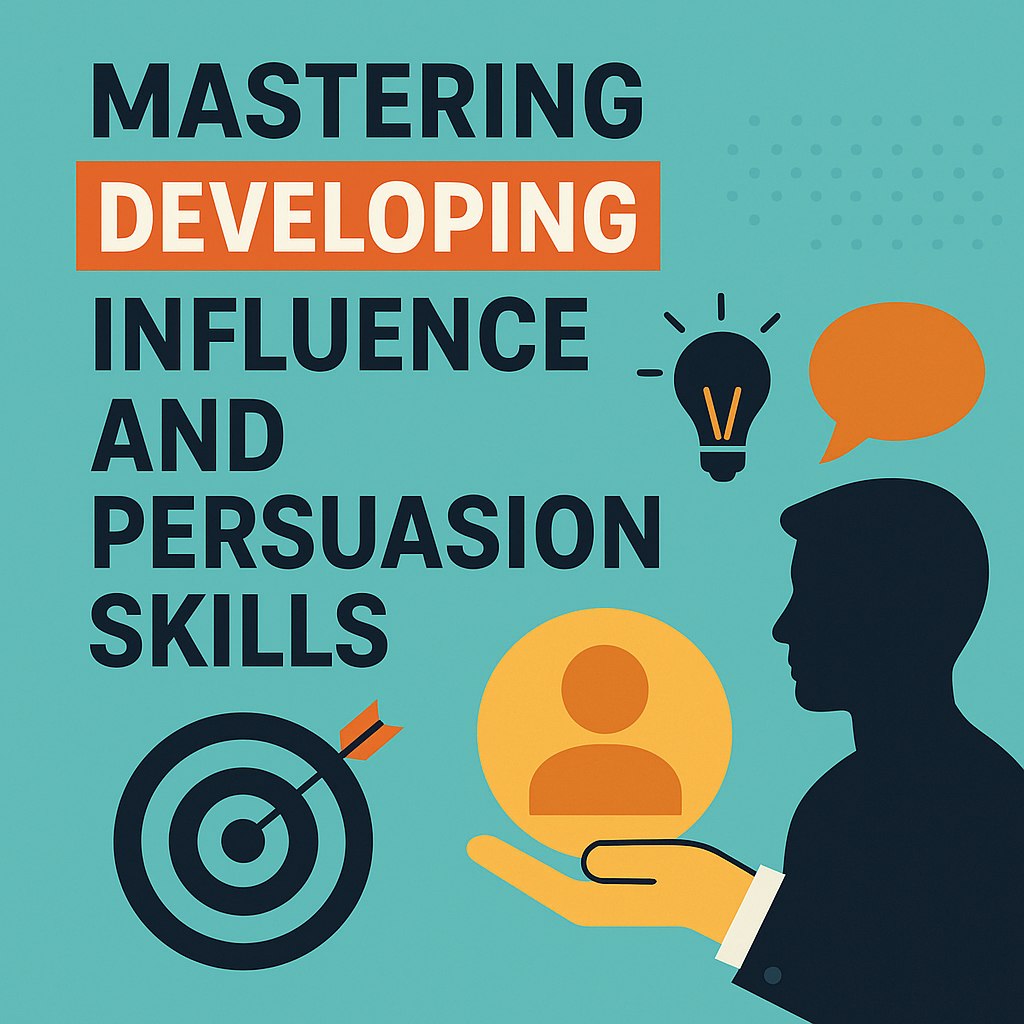Mastering Developing Influence and Persuasion Skills: Essential Tips for Success
Do you want to develop influencing skills to become more influential and persuasive professionally and personally? Developing influence and persuasion skills is critical for advancing your career, resolving conflicts, and building strong relationships. This article provides practical techniques and psychological insights to enhance your ability to influence and persuade others effectively.
Key Takeaways
- All professionals must master influence and persuasion, enabling effective leadership and conflict resolution.
- Key components of persuasion include emotional appeal, credibility, and logical reasoning, which create compelling communication.
- Continuous practice and seeking feedback are essential for refining persuasive skills and fostering strong workplace relationships.
👉 Ready to turn these takeaways into real-world results? Let’s chat about how you can master persuasion in your unique business environment. Book your free 15-minute session here.
Understanding Influence and Persuasion

Influence is the ability to affect the behaviour of others, a skill that transcends job titles and industries. Persuasion, a key skill for leaders, involves inspiring and aligning teams, making it indispensable for anyone looking to lead or collaborate effectively. Regardless of your career stage, enhancing your influencing and persuasion skills can yield significant benefits, from resolving conflicts to advancing your career and learning to influence people. Being influenced by effective leaders can further enhance these skills.
Self-awareness is crucial in developing influence and persuasion skills. It helps individuals recognize their biases and strengths, enhancing their ability to connect with and influence others.
Effective leaders are those who not only understand the art of persuasion but also excel at presenting arguments and motivating action while working effectively. They inspire, persuade, and encourage their teams to achieve collective goals as a leader.
Understanding the six crucial elements of influencing and persuasion can help you gain influence and take control of your career. The significance of these skills in the workplace cannot be overstated, as they help convince others and establish a professional reputation.
What Are Influencing Skills?
Influencing skills blend abilities and characteristics that facilitate interaction and persuasive communication. Developing persuasion skills aims to convince others that a desired action is the right course. Active listening is a fundamental component, as it builds trust and enhances persuasiveness by helping you understand others’ perspectives. Understanding your influence can lead to more effective interactions with others.
Explore different aspects of persuasive communication to enhance your influencing skills.
For leaders, influencing involves steering long-range objectives and inspiring others to achieve those goals. Effective communication significantly enhances the ability to persuade others about ideas and goals, whether guiding teams or engaging in one-on-one interactions. Honing these skills can significantly improve leadership effectiveness.
🧭 Want help identifying your influencing strengths and blind spots? Let’s assess them together. Click here to book a quick strategy call.
The Psychology Behind Persuasion
Cognitive biases play a significant role in how people are persuaded, influencing their decision-making processes. Understanding these biases can help craft persuasive messages that align with how people naturally think. Emotional triggers are equally important, as they can significantly change attitudes and behaviours. Utilizing these triggers effectively can engage your audience personally, making your message more impactful.
Emotions such as empathy, excitement, fear, and hope can be powerful tools in persuasion. Connecting with your audience emotionally makes your message resonate more deeply, enhancing its persuasive power. Combining an understanding of cognitive biases with emotional triggers can create a compelling and persuasive communication strategy.
💡 Understanding psychology is one thing — applying it effectively is another. Let’s build a practical plan tailored to your goals. Book a 15-minute call with me now.
Core Elements of Effective Persuasion

Persuasion is built upon three fundamental elements: logic, credibility, and emotional connection. Understanding your audience’s motivations and creating tailored messages can significantly enhance your persuasive efforts. Persuasion aims to sway decisions by influencing the audience’s emotions. Trust, built through consistent and genuine interactions, is critical for successful persuasion.
Learning from effective communicators can help you develop a persuasive voice, enabling you to communicate more compellingly.
These elements work together to create a cohesive and compelling message. Combining logical reasoning, emotional resonance, and credibility crafts persuasive communications that are convincing and trustworthy. Each element is crucial in ensuring your message is received positively and acted upon.
Building Credibility (Ethos)
Establishing yourself as a reliable source can significantly enhance your persuasive capabilities. Positioning yourself as an expert helps you more easily convince or persuade others. Credibility is an essential element of persuasive communication. Actions, messaging consistency, and honesty influence people’s perceptions of your integrity. Respect for a speaker increases openness to ideas, thereby enhancing persuasion.
More trust leads to a stronger influence over your audience. When a speaker exhibits trustworthiness, the audience is more likely to listen and believe. Nonverbal communication, such as body language, can significantly enhance the perceived sincerity and trustworthiness of the message.
Therefore, building credibility is not just about what you say but how you say it.
🔐 Want to strengthen your authority and become the trusted expert in your field? I’ll show you how. Let’s talk.
Emotional Appeals (Pathos)
Pathos refers to the emotional aspect of persuasion. Successful persuasion often hinges on the emotional resonance of your message with the audience. A speaker can evoke various emotions, such as empathy and excitement. By doing so, they can instill feelings of fear and hope to craft a compelling message. Emotional appeal helps listeners relate to the message, making it more impactful.
Influential communicators should combine logical explanations with emotional connections to engage their listeners effectively. Understanding and tapping into your audience’s emotions makes your message more compelling and persuasive. Emotions are crucial in how people perceive and respond to your message.
Logical Arguments (Logos)
Logos involves the application of logic and reason in communication. It emphasizes the importance of using evidence to persuade an audience. The core components of persuasive communication are Ethos, Pathos, and Logos. Combining logic and emotion increases the effectiveness of persuasive messages. Using clear and structured reasoning is essential for crafting convincing arguments.
Logical reasoning verifies the message and increases its reliability. Clear logic and verifiable facts are essential for a strong, persuasive message. Additionally, relevant examples further enhance its effectiveness by supporting a point. Effective arguments include data, facts, examples, and logical reasoning.
Logos is particularly important in analytical or professional settings, where evidence-based arguments are crucial; for example, research helps to strengthen the validity of claims.
Developing Key Persuasion Skills
Effective persuasion requires influencing, communication, emotional intelligence, and active listening skills. Using persuasive skills can yield significant benefits in daily interactions and negotiation scenarios. Key influencing skills encompass political savvy and self-promotion. Additionally, building trust and networking are also important components. Boosting persuasion skills involves learning proven techniques applicable in real-life contexts.
Improving your influencing skills can advance your career and assist in obtaining leadership positions. Regularly practicing persuasive techniques is essential for continuous improvement. Highlighting your influencing abilities involves several actions that demonstrate your skills effectively.
Whether you focus on specific areas or train in multiple skills simultaneously, the most effective way to master persuasion is through continuous practice and application.
Active Listening
Active listening is a technique for holding interpersonal conversations that fully focuses on understanding another person’s perspective, asking clarifying questions, staying present, and reflecting on what you hear while giving close attention. Active listening fosters openness and trust, making others more receptive to your ideas. Improving active listening involves engaging with the speaker, demonstrating emotional intelligence, and tailoring your communication to the audience’s values and needs.
Active listening demonstrates empathy and respect for the speaker, enhancing your persuasive abilities. This skill is crucial for building rapport and trust, making it easier for an active listener to influence others. Active listening in group discussions and daily interactions can significantly improve your persuasive abilities.
👂 Listening is a superpower in business. Want to sharpen this skill to lead better conversations? Book a short coaching call with me today.
Enhancing Communication Skills
Strong communication skills are essential. They serve as a foundation for influencing and persuading others. Improving communication skills enhances persuasive abilities. Effective communication engages individuals and makes them more open to being persuaded. Clear and concise communication is essential for understanding your persuasive message. Key aspects of effective communication in persuasion include tone of voice, body language, and clarity.
Written and verbal communication skills encompass body language, nonverbal gestures, sentence structure, and connotation. Engaging in conversations and contributing to group discussions helps practice communication skills.
Observing effective communicators can improve your persuasion skills by analyzing their message structure, tone, body language, and approach adjustments. Collaboration helps develop stronger communication skills.
Building Trust and Rapport
Building trust is essential in persuasion as it enhances the likelihood of being trusted and makes persuasion easier. Being trustworthy helps people believe that your goals will benefit them. Developing workplace relationships can be a helpful strategy for improving persuasive skills. Emotional intelligence can assist in conflict resolution by helping to perceive others’ emotions. Networking opens doors and provides opportunities to influence others in a professional context.
Learning from effective communicators and role models can strengthen your influence and persuasive skills. A mentor can provide guidance based on experience, helping develop influencing skills. Following through on promises and admitting mistakes can reinforce trustworthiness. Demonstrating selflessness and a willingness to help others can enhance trustworthiness.
Practical Techniques for Influencing Others

According to effective leaders, the main goal of influencing others is to influence them, not manipulate them. Effective, ethical leaders consider the context and the appropriate approach when influencing others. Organizational intelligence involves understanding formal and informal organizational structures, which is crucial for influencing people effectively. Influential leaders are strategic about choosing when to tap into their networks. Leaders must ensure their networks are dynamic and growing to maintain influence over their peers.
Politically savvy leaders view politics as neutral and necessary for advancement, which helps them navigate influence more effectively. Persuasion techniques can effectively sway consumer choices in sales and marketing. In political contexts, effective persuasion methods can influence public opinion and garner voter support.
Crafting Compelling Arguments
Communicating intended outcomes is essential as it clarifies the goals and explains how to achieve them. Effective persuasion utilizes factual evidence and emotional motivators to resonate with the audience. Rational persuasion techniques can be particularly effective when presenting factual evidence to support arguments. Using inspirational appeals or consultation methods can help generate buy-in for proposals.
Without understanding the audience’s values and preferences, arguments may fall flat.
Maintaining a personal portfolio can showcase achievements and enhance influence while persuading. The effectiveness of persuasion often hinges on choosing the right moment and environment for discussions. Participating in group discussions, role plays, and presentations helps improve persuasive communication skills.
Workshops and seminars are effective events for developing persuasive skills.
📣 Let’s craft your most persuasive message yet — tailored to your business needs. Click here to reserve your 15-minute session.
Using Body Language Effectively
Body language is a crucial aspect of nonverbal communication that supports and reinforces your message. Reading body language helps understand others’ emotions and reactions, aiding in effective communication. Nonverbal cues such as gestures are vital for persuasion, as they enhance the meaning of spoken words. Effective use of body language can establish authority and credibility in communication settings.
Eye contact, facial expressions, and posture convey confidence and sincerity, making your message more persuasive. Practicing good body language in everyday interactions can help you become more aware of nonverbal cues and improve communication effectiveness.
Leveraging Emotional Intelligence
Emotional intelligence encompasses communication, compromise, and interpersonal awareness, essential for understanding and managing emotions. Effective negotiation requires leaders to utilize emotional intelligence to adapt their persuasive strategies based on the emotional climate. Recognizing and addressing others’ emotions allows you to tailor your communication to be more persuasive and engaging.
Leveraging emotional intelligence involves being aware of your own emotions and those of others. This awareness helps craft messages that resonate emotionally, making your persuasion efforts more effective. Practicing emotional intelligence in various situations can significantly enhance your ability to influence others and achieve desired outcomes.
Real-World Applications of Influence and Persuasion

Influence and persuasion are crucial for effective leadership and affect personal and professional interactions. Leaders should recognize that influence is not merely about authority but about inspiring and motivating others toward common goals. In workplaces, persuasion can motivate employees and assist in conflict management. People seek appreciation of vulnerability, inspiration, understanding, support, and guidance from leaders to build trust.
Trust in leadership involves balancing pushing individuals out of their comfort zones and listening to their concerns. Establishing genuine relationships based on mutual respect and trust is essential for workplace dynamics within the organization. Common interests can enhance persuasion by making the listener more open to new ideas and help build relationships through trust and relationship building.
Interpersonal skills are important in the workplace as they enhance communication and trust among team members, highlighting the value of each interpersonal skill.
🚀 Curious how these skills apply in your leadership or team dynamics? Let’s explore it together. Book your free call now.
Navigating Workplace Relationships
Influencing and persuasive skills help build strong workplace relationships and foster collaboration. Improving influencing and persuasive skills at work enhances workplace relationships and facilitates collaborative goals. Effective workplace relationships increase productivity and reduce conflicts among employees. Persuasion skills expedite group decisions and lead thought processes, essential for effective communication.
Being judgmental or inflexible can lead to a failure to influence others, highlighting the importance of respectful treatment. Successful persuasion involves treating others with respect, which fosters a positive workplace environment.
Collaboration in a workplace context involves working together to achieve a mutual goal. Helping both sides collaborate or compromise is crucial for handling conflicts among colleagues and team members.
Leading Teams with Influence
Working on influencing skills can enhance the likelihood of being considered for leadership positions. Motivating others is crucial for effectively administering feedback and delivering messages in management. Credibility in leadership helps earn influence and respect from team members. Regular participation in collaborative projects builds relationships and enhances one’s brand.
Great leaders understand the importance of influence in achieving organizational goals. By developing strong interpersonal skills and building trust, leaders can inspire their teams to perform at their best. This influence extends beyond individual interactions and can shape the culture and success of entire organizations, highlighting the need for effective leadership skills.
Negotiation and Conflict Resolution
The purpose of negotiation is to reach a compromise that satisfies both parties. Finding a mutually beneficial solution is an essential component of effective persuasion in negotiation. Successful negotiations often require the parties to identify shared interests and work towards a compromise. Flexibility with ideas and consideration of the other party’s ideas are necessary for successful negotiation.
Understanding a colleague’s emotions can help tailor methods to suit their reactions during negotiations. Emotional intelligence helps interpret emotions and adjust persuasion methods effectively.
In the workplace, persuasive skills are used to sell products, negotiate deals, and arrange plans. Practicing negotiation skills is essential for mastering the art of persuasion.
Continuous Improvement and Practice

Mastering persuasion is an ongoing process that requires understanding and consistently applying key principles. Developing persuasion skills requires regular practice and reinforcement of learned techniques. Cultivating relationships helps practice interpersonal and emotional intelligence skills essential in persuasion. Interpersonal skills improve communication, helping to build rapport and effectively influence others in various scenarios.
Continuous improvement involves seeking feedback, engaging in regular practice, and learning from role models. Consistently applying these strategies refines your persuasion skills, making you a more effective influencer. This ongoing process ensures you stay adaptable and skilled in various communication contexts.
Seeking Feedback
Actively requesting feedback helps identify strengths and areas for growth in persuasion techniques. After presenting your views or attempts at persuasion, spend a few minutes reviewing conversations or journaling about your attempts. Employers, colleges, and private organizations provide training sessions. These sessions aim to enhance persuasive speaking and writing skills. Books, apps, online tools, and professional guidance development courses can help improve influencing skills. Consider seeking suggestions to refine your approach further.
Updating social media can help track and improve persuasive skills through analytics on content engagement. Seeking feedback regularly provides insights into your communication style, allowing for necessary adjustments to enhance your persuasion abilities. Feedback is a valuable tool for continuous improvement and growth.
Engaging in Regular Practice
Daily practice in real-life interactions can significantly enhance persuasion skills. With more practice, persuasive skills develop more naturally and effectively. Tools like the Exercising Influence app can help individuals improve their influencing skills. Regular practice is essential for mastery of persuasion and influence skills.
Engaging in regular practice helps maintain and improve your persuasive abilities. Incorporating persuasion techniques into daily interactions refines your skills, making you more adept at influencing others. This consistent practice ensures you remain effective and confident in your persuasive efforts.
Learning from Role Models
Observing successful communicators can reveal effective persuasion strategies. Books and resources on persuasive communication can greatly help improve persuasive communication skills. Studying successful influencers and persuaders provides valuable insights into effective strategies and approaches. Leveraging lessons from role models and available resources enhances one’s influence and persuasion skills.
Learning from role models involves recognizing and emulating their successful strategies. By studying how great leaders and communicators persuade others, you can adopt similar techniques and improve your persuasive abilities. This approach provides practical examples and inspiration for continuous improvement in your persuasion skills.
Summary
In conclusion, mastering influence and persuasion is a multifaceted journey that involves understanding core principles, developing key skills, and continuously practicing and refining your techniques. You can create persuasive messages that resonate with your audience by building credibility, appealing to emotions, and using logical arguments. Developing active listening, effective communication, and emotional intelligence skills is crucial for becoming a successful influencer.
Remember, persuasion is not about manipulating but inspiring and motivating others towards common goals. Applying the strategies and techniques discussed in this guide can enhance your ability to influence others ethically and effectively, leading to personal and professional success. Keep practicing, seeking feedback, and learning from role models to improve your persuasion skills continuously.
🎯 You’ve learned the principles — now let’s make them actionable. Book a free 15-minute coaching call and start influencing with intention. Schedule now.
Frequently Asked Questions
What are the core elements of effective persuasion?
To persuade effectively, focus on logical arguments, establish credibility, and appeal to emotions. Mastering these core elements will elevate your persuasive skills and impact!
How can I build credibility in persuasive communication?
To build credibility in persuasive communication, position yourself as an expert and ensure consistency and honesty in your messages. Embrace nonverbal cues to enhance your sincerity and trustworthiness, and watch your influence grow!
Why is emotional intelligence important in persuasion?
Emotional intelligence is crucial in persuasion. It allows you to connect with others by understanding and responding to their emotions effectively. By tapping into this skill, you can enhance your communication and influence others more powerfully.
How can active listening enhance my persuasive abilities?
Active listening significantly boosts your persuasive abilities by building trust and making others more open to your ideas. By truly understanding their perspective, you can tailor your message to align with their values.
What are some practical techniques for influencing others?
To successfully influence others, focus on crafting compelling arguments with factual evidence and emotional appeal while also effectively using body language. Harness your emotional intelligence to tailor your approach based on the feelings of those you are trying to persuade.



